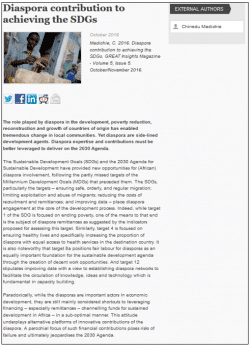
Policy highlights:
- Engagement of the diaspora is crucial in poverty reduction and development in their countries of origin. However, diaspora are often side-lined as development agents and are mainly considered shortcuts to easy finance. This attitude underplays alternative platforms for innovative contributions by the diaspora.
- To ensure that the potential of the diaspora is put to use for sustainable development, concerted efforts must be made by all stakeholders to develop policy objectives that facilitate mobilization of the diaspora.
- To actively engage the diaspora in the development process policymakers are advised to: 1) acquire accurate statistical data about the diaspora in order to fully understand their socio-economic and demographic characteristics, attitudes, and possible areas of interest for collaboration; 2) address the many technical and legal trade barriers that exist for remittances and investments by members of the diaspora; 3) facilitate easy capacity building, such as the transfers of skills, knowledge and technology between members of the diaspora and their home countries; 4) actively involve the diaspora in development policymaking and implementation; and 5) implement well-defined migration policies (including easier access to legal status in destination countries, enabling dual-citizenship, and reducing bureaucratic procedures) in order to improve the prospects of generating decent work opportunities for the diaspora, thus accelerating the whole sustainable development agenda.







